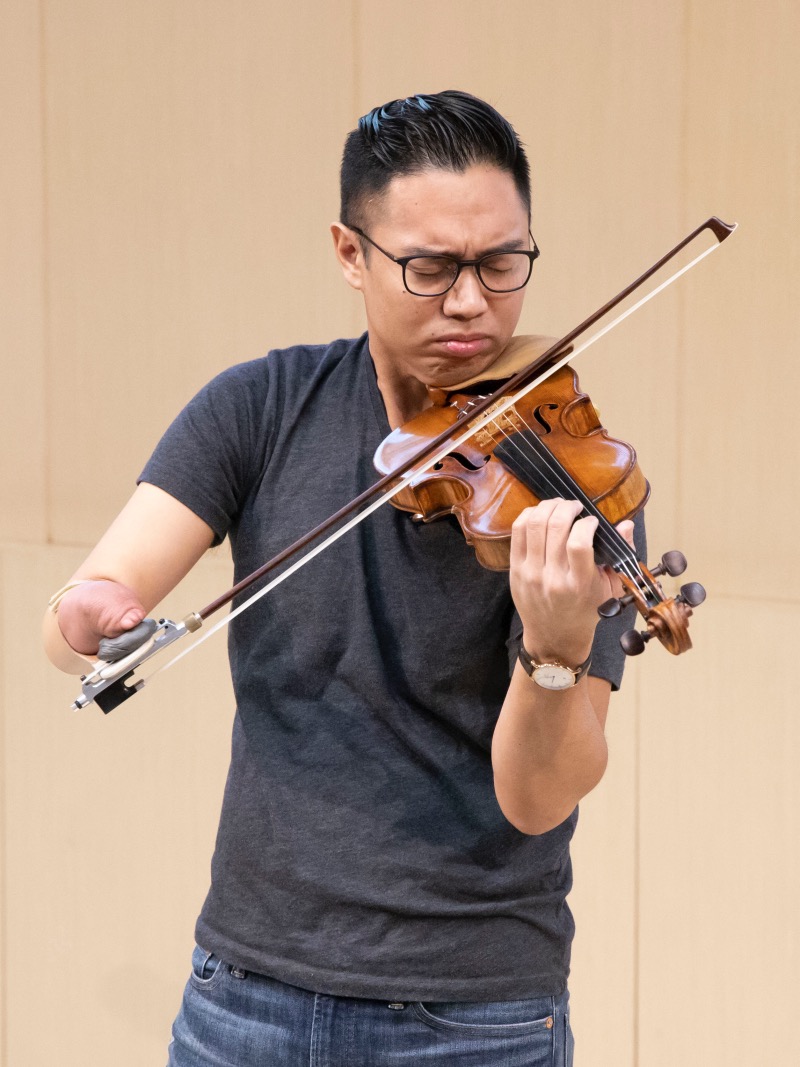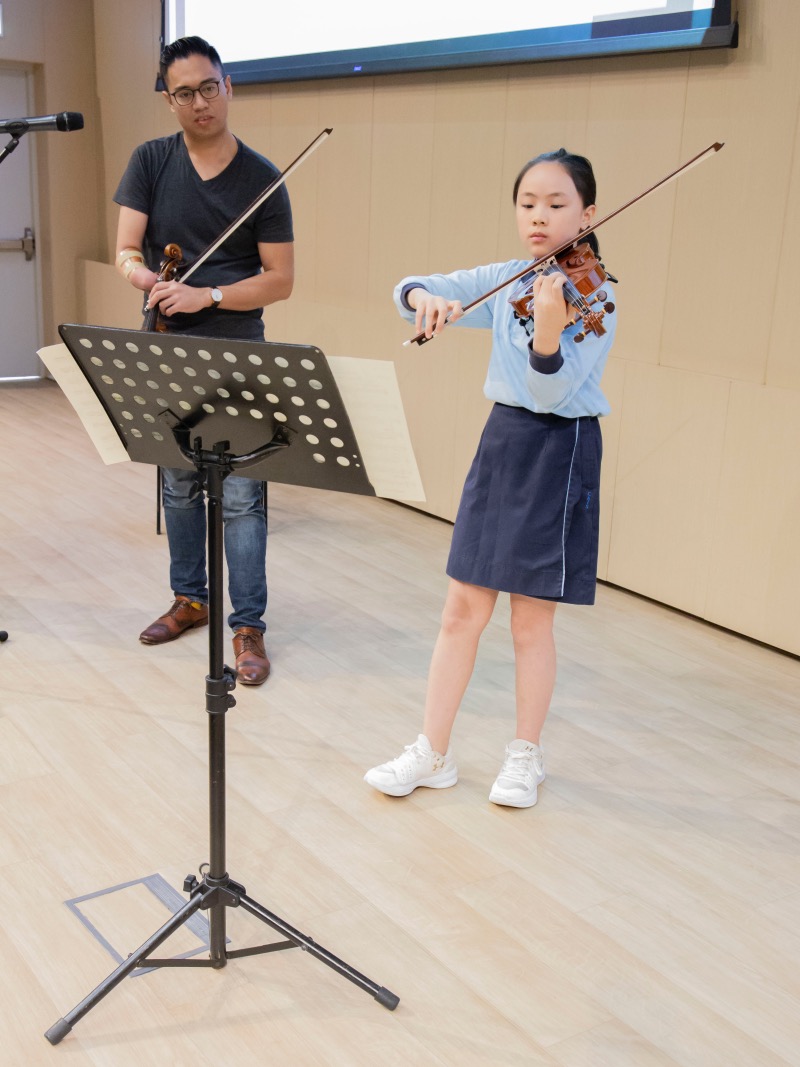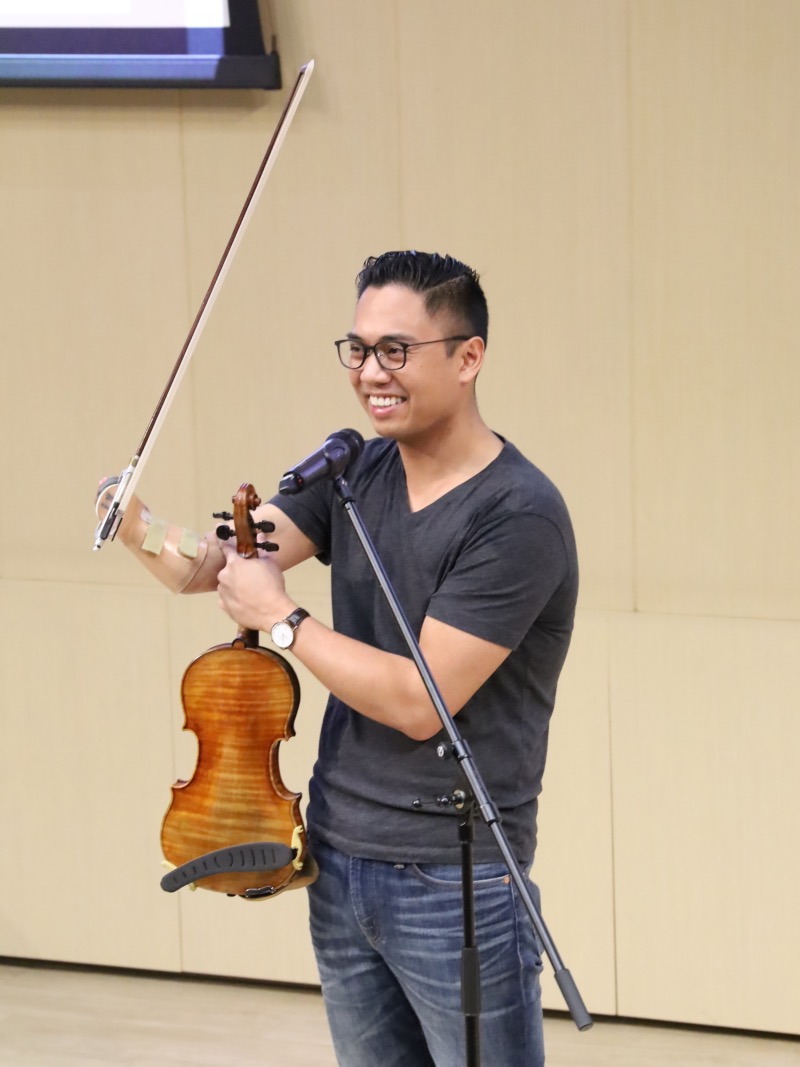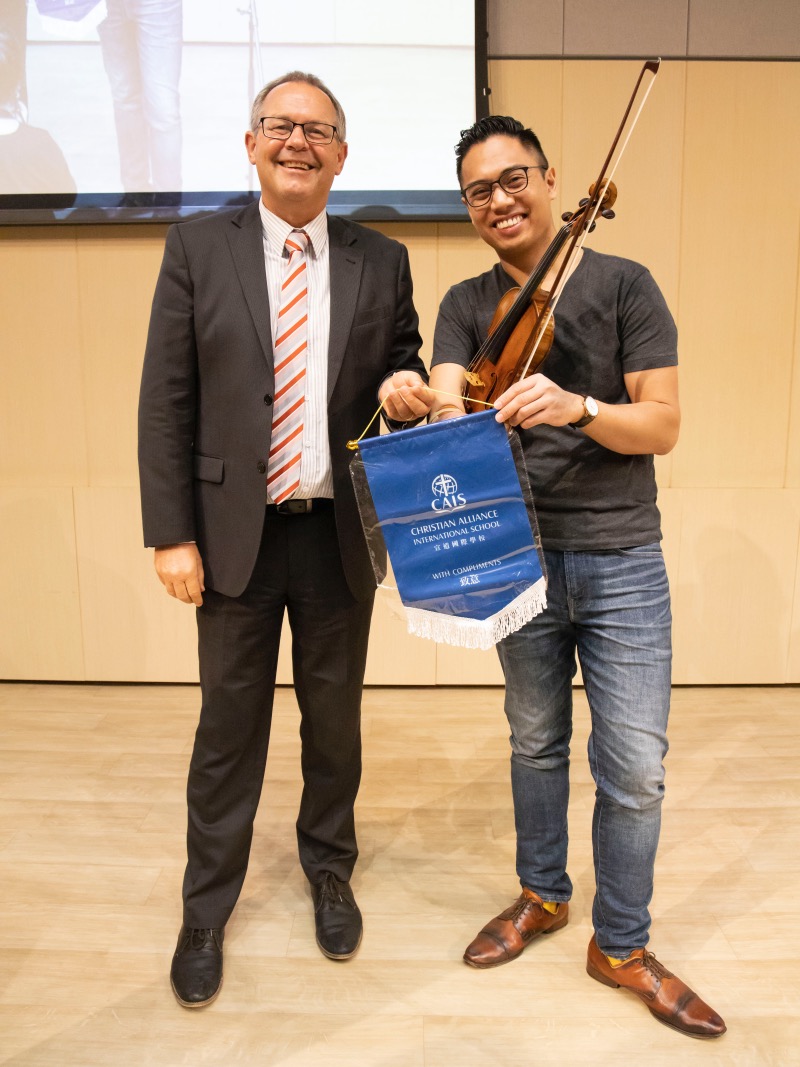Violin Virtuoso Adrian Anantawan visits CAIS and speak about his work and journey toward becoming a professional musician
June 12, 2020
Born and raised in Canada, Adrian Anantawan became a phenomenon demonstrating his pursuit to become a professional musician, regardless of the obstacles. Born without the right arm, through determination and hard work, Adrian became one of the most influential musicians of his generation. One of his teachers included Itzhak Perlman and Anne-Sophie Mutter. Being a Disability Advocate, Adrian has been blessed with many memorable life events, including performances at the White House or during the Opening Ceremonies of the Athens and Vancouver Olympic Games. He has also played for the Saint John Paul II and His Holiness the Dalai Lama. Part of his calling is to work with young people and inspire them to be the best version of themselves. That is why, Adrian has been travelling around the world sharing his personal story, his struggles with disability at the beginning of his life, and his life’s work. While on tour around Asia, in early January 2020, Adrian took some time to visit CAIS prior to his performance with True Colors Symphony – a Hong Kong based inclusive orchestra, the members of which he had also trained.
We sat down with Adrian to hear more about his perception on inclusion and disability in music, as well as learn about his inspirations and upcoming projects.
CAIS
Adrian Anantawan
What was the motivation to start bringing diversity into the music world?
Why do we even speak about disability in music – shouldn’t we share art through music without pointing out the disability?
Growing up, it has been a struggle to be able to figure out what my identity as an artist was. I was pursuing a type of art form, which is very rigorous and it’s not only about being inspirational, but it’s about having certain technique, musicality, having a very high standard for yourself – that is often defined by others. One of the equalizers about music is that it’s not how you look but it’s how you sound. Being able to think that someone can close their eyes and just hear rather than seeing someone who is missing a hand – it was and still is important to me. I also knew that art is also about sharing what is unique about you. However, we’re in such a visual culture, that people will see a disability first. So, what do you do with that: do you ignore it and allow the work to speak for itself or does it give you a platform to be able to share your message? Therefore, as I grew older, this became more and more of a responsibility for me because we don’t see people with disabilities in a classical music business.
Anytime that I interact with young people, with students, I definitely want to share more about my story, because I think classical music in general for kids is already not as accessible as it should be, so sharing a story and speaking through notes, and having a personal relationship with an artist, is going to enhance their appreciation of the muse.
Depends on the time and the context, I’m always thriving to be the best version of myself as an artist. I continue practicing as if I am not even sharing anything about the disability, but really about the music, and that helps.
You are based in Boston where you teach at Milton Academy. Career-wise, when not on tour, what is it that you do?
I was performing and travelling a lot as I was graduating from college and being able to do the typical career-development steps as an artist was great. However, for me I have always pursuit towards more sustained relationships over time with people. While it’s great to visit schools, like today being at CAIS, it is what we are going to do from there is important – I want to be able to create larger movements and actions resulting from it that can help people, who might be going through similar experiences like me, over long-term. Education seem to be the way in, so I went back to school and decided that I wanted to get a degree. Specifically, thinking about how I could help kids with disabilities to have access into orchestral- and music education in general. Part of that is the advocacy aspect of it, knowing how to share my story and promote things that are already happening within the inclusion programmes, part of it is how to do research and evaluate effectiveness of art programmes in education. Finally, also being in the classroom and interacting with kids and getting that information from the first-hand experience is a wonderful material.
After finishing the degree, I directed a music programme for around 700 children, within arts and leadership project in Boston, which was a valuable experience, as a young arts administrator and teacher. Then I took a year off and moved on to independent schools. I’m currently sharing a department at Milton Academy, where I do teach on the ground, admin and working on connecting our students, who are very privileged, to various service projects through music. We are trying to show them that this is not just about learning for yourself, but the tools, experience that you have could be shared in the way that can help others.
What’s your next project that you are working on currently or plan in the next couple of years?
I’m working on the project in Boston at the moment, it is called The Music Inclusion Programme. We have about 20 first and second grade students with and without disabilities learning together to be able to make an orchestra. We wanted them to start early, allowing that culture to be built from the ground up. What if we give a very high-quality music education to those kids from the very beginning? What type of attitudes, benefits and art can we create as a result of putting the young musicians together – this is what we want them to learn and this is how this idea came to life. It has been of an experiment in terms of figuring out the right types of teachers, the right types of tools and technology. We also trust that kids are going to be able to run with it and do something amazing. That’s the big project as I travel, though. I would love to be able to have this programme up and running in five years and then I can continue to travel and perform and have both feet in the water.
What’s your perception of disability cultures around the world?
Through my trips I continually see how the disability culture looks from country to country. It’s very interesting that children are the same, human determination is the same, disability and overcoming as well – it’s just knowing that the world is a big place and you’re not alone with your disability. From a purely individualistic standpoint, knowing where’s my place in this world, understanding how to connect with others, is important to me. As I grow up, I felt isolated and different, but as I continued with music and travelled, it’s became of a great benefit.
Does it include lots of resources and funding in order to continue with your projects?
High quality education requires resources, but you must have faith in that you’ll have high quality outcomes as a result. Part of it is through the right teachers -allowing them to grow and evolve with the students. Another part of it is finding people with the right mission, who will be doing it not because it’s just a job, but because it’s a calling. I think that the greatest resource that you can give, though, is caring about what you do. Music, if presented in the right context allows you to do that, as well as with kids, which I really like. Anytime you see a child successful, it makes it very meaningful to understand that there are challenges in creating any programme, but the results are that you find yourself closer to God than when you started.
When it comes to faith – how much do you leave for God and how much to your determination and hard work – or is this a good balance of those elements?
It is a balance. There are certain things that are out of your control and you just let life figure it out. We have a desire to make meaning out of those random and chaotic things that happen in life and I think that’s where faith lies. The entire determination aspect and finding the little spirit to do something positive helps to channel into something else. It’s all about listening and understanding what it’s being called to you, when it’s time to change directions. Anytime I engage in major types of decision, I think what if the fear wasn’t part of the decision, and what are you doing to offer the greatest version of love that you can give. As uncomfortable as any challenge or struggle has been, it always led to something better.
Could you reflect on your own teachers and how impactful was their input on your life? You have also been taught by ltzhaak Perlmann – how did that collaboration come into life?
I think that some of my greatest teachers are the family and friends. I think that as you get older, your peers become as much educators to you as teachers. Teachers more become facilitators, they’re making sure that you have a framework for discussion or can steer ways of questioning. Peers, on the other hand, understand each other more. I learned a lot being in youth orchestras or in high level training programs with people similar to my age.
In terms of great mentors, you don’t even need the teacher to be physically there -with ltzhaak Perlmann, I learned from him by just listening to him on the radio and from his recordings. I was just lucky to be able to get to know him. I always looked up to him as he grew up with disability himself. I had a great picture of him my wall: an idol an inspiration to me. He visited Toronto when I was about 15 years old and I had an opportunity to play for him. He then invited me to come to one of his summer festivals and few years later I started to study with him.
Favourite Composer?
It’s hard to say, there are so many. I like Bach – for the reason of the scope of time and timelessness of his music and yet bringing it to the present it’s always a bit of a miracle to me. You could probably say that you have a composer in your pocket for any type of mood. New composers are very interesting, too. It’s important as a musician to respect your colleagues for making a new music these days and bringing interesting ideas.
Do you compose yourself?
I don’t -I believe classical music is this art of recreation. There’s a creativity within that but not in the same way as making and producing music. I do a little bit of improvising, though.
Join us to discover Adrian’s amazing journey here:
[cool_tag_cloud]




